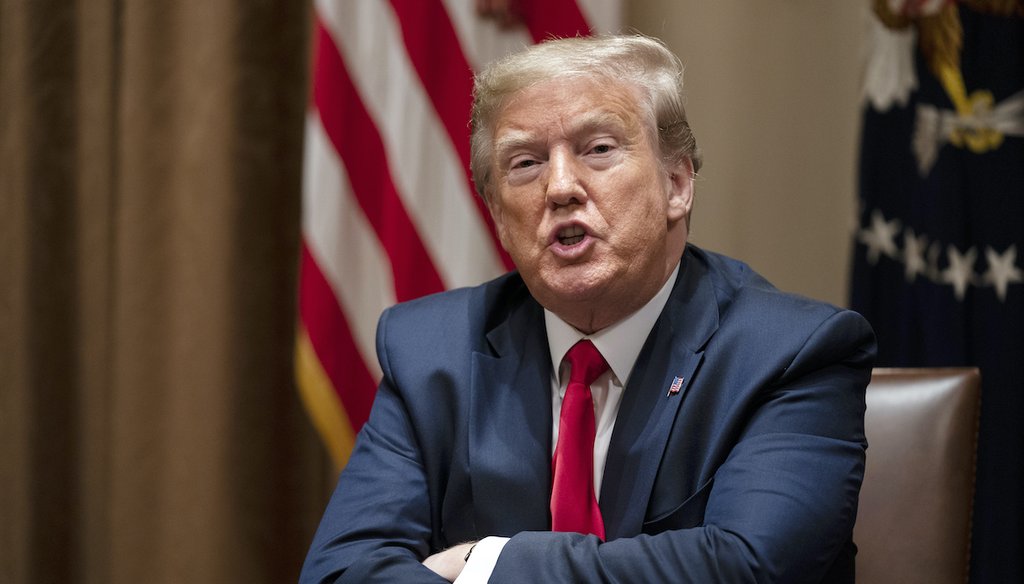Stand up for the facts!
Our only agenda is to publish the truth so you can be an informed participant in democracy.
We need your help.
I would like to contribute

President Donald Trump speaks during a meeting with health care executives, at the White House, on April 14, 2020. (AP)
"The Week in Fact-checking" compiles short summaries of our best work; the links will take you to our full reports. Want this report early and via email? Sign up here.
This week: Trump on presidential power … the perils and promise of antibody testing … Nobody has died twice .... Democratic Rep. gets U.S. testing numbers wrong … Ron DeSantis gets victim age wrong … Don’t fall for stimulus 800 number scam
Trump’s claims for presidential ‘control’ debunked by Constitution, amendments
Twice this week, President Donald Trump asserted that he had more control over re-opening the country than the nation’s governors. Twice, he was contradicted by both legal precedent and the Constitution itself.
It started on Monday on Twitter. "For the purpose of creating conflict and confusion, some in the Fake News Media are saying that it is the Governors decision to open up the states, not that of the President of the United States & the Federal Government. Let it be fully understood that this is incorrect," Trump tweeted April 13. "It is the decision of the President, and for many good reasons. With that being said, the Administration and I are working closely with the Governors, and this will continue. A decision by me, in conjunction with the Governors and input from others, will be made shortly!"
We rated Trump’s claim False. It’s the states that provide licenses for businesses and have primary responsibility for making decisions about public health. The president can encourage states to re-open, but he can’t order them to do so.
Sign up for PolitiFact texts
"The simple answer is governors have way more legal authority than the president of the United States to make these decisions about closing and opening facilities, closing and opening the economy," said David Schultz, professor of political science and legal studies at Hamline University.
Wendy K. Mariner, a Boston University health law professor, added that governors can end closure orders, that isn’t the same as ordering businesses to re-open. Some may not be able to afford it.
Later that day, reporters asked Trump at a White House briefing about his authority.
"What provision in the Constitution gives the president the power to open or close state economies?" a reporter asked.
"Numerous provisions," Trump replied. "We’ll give you a legal brief if you want."
When a reporter asked again, Trump said, "The authority is total, and that’s the way it’s got to be."
The president is the top elected official in the country, but he does not have supreme power to dictate all rules for states and local governments. The federal government only has powers given to it in the U.S. Constitution; the rest are reserved for the states, said Polly J. Price, a professor of law and global health at Emory University. The 10th Amendment specifically says that powers not delegated to the federal government are reserved for the states.
Legal experts say no part of the Constitution gives the president unlimited power.
At his White House briefing the next, Trump partially backtracked and said he won’t pressure any governor to open up their states and that it’s up to the governors to run their states. "The governors are going to be opening up their states. They’re going to declare when — they’re going to know when."
— Amy Sherman
Fact-checks of the week
U.S. testing has improved. U.S. Rep. Bobby Scott, D-Va., claimed the United States ranked last when it came to per-capita testing for the coronavirus. PolitiFact Virginia rated that False. Scott’s data was old; the United States recently improved its testing numbers and no longer comes in last.
Young people have died. Gov. Ron DeSantis, R-Fla., said, "This particular pandemic is one where I don’t think nationwide, there’s been a single fatality under 25." We rated that Pants on Fire! The CDC, news reports and the counts of state health officials in places like New York show the statement to be false. We don’t have precise numbers for total deaths, but we can say with certainty that deaths in people 25 and under do exist.
Nobody died twice. "Corona is so bad, this guy died twice! #FakeNews," reads the text above what look like screenshots of two news articles. In the first, a headline reads, "69-year-old retired Milwaukee police lieutenant died from COVID-19." A photo underneath shows a man in a suit and glasses. The second screenshot shows the same picture but with this headline: "University of Memphis professor dies from coronavirus, report says." We rated the post False. Dr. Lenard Wells spent 30 years working for the Milwaukee Police Department before he started teaching at the University of Memphis, according to news reports. He was an instructor in the Department of Criminology and Criminal Justice. The two reports describe the same person’s (one) death.
Knowing the facts has never been more important: Please consider donating to PolitiFact today.
Antibody tests: The promise and pitfalls of using them to reopen the US
Antibody tests hold promise as a way to clear people who have recovered from a coronavirus infection, allowing them to go back to daily life without fear of infection.
Antibodies are proteins that are key elements of the body’s immune response to germs. People who have them have battled the coronavirus and are believed to have at least some immunity to the virus.
One challenge is that scientists aren’t sure yet how long immunity from a past coronavirus infection will last, and how effective it will be at preventing reinfection.
A rash of antibody tests are now being tried, but so far, their accuracy rates have not been as high as scientists want to see. Still, experts say that useful tests could be available within a few months.
Reporter Louis Jacobson answered six questions about antibody testing, including what’s been done so far; how accurate they are; and how long immunity from antibodies might last.
Pants on Fire!
Do you smell smoke?
Here's your Pants on Fire fact-check of the week:
No, there’s NOT an 800 number you can call to track the status of your stimulus check.
Watch out for this scam! There’s no 800 number to call to check on stimulus checks. The real IRS has a webpage with information about payments.
See what else we've rated Pants on Fire this week.
Our Sources
See individual reports for sources.



















































